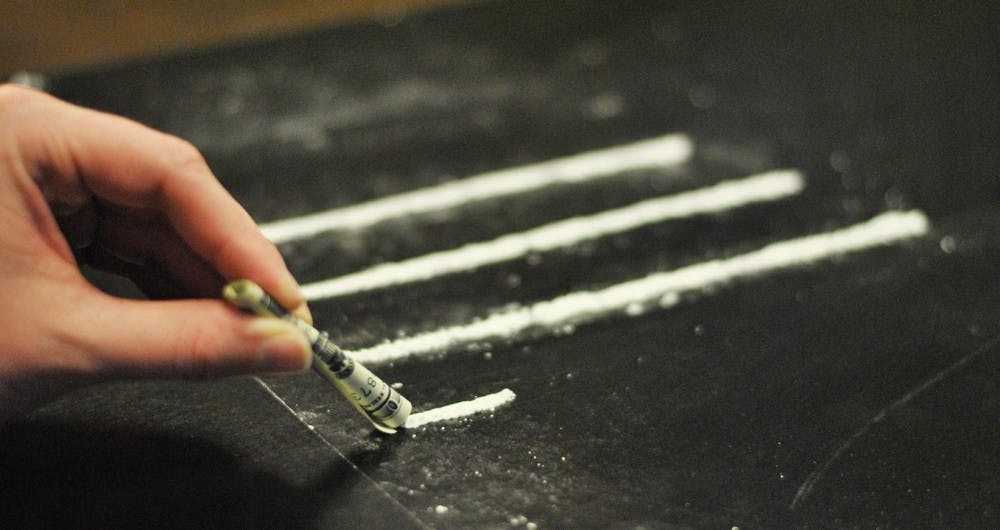“Most of that type are going to last months long. They never really end when the arrest happens, we’re just starting then.”
Carrboro increases
Carrboro police officer Brad Ward estimated that cocaine incidents account for 80 to 90 percent of Carrboro’s drug investigations.
On Feb. 9 at 5:37 p.m., Mack James Matthew Cameron, 40, was arrested in Pittsboro for selling cocaine — adding to that statistic.
Cameron, who has gone to prison for selling cocaine in the past, was taken to the Orange County Jail and held on $60,000 bond.
Ward said an undercover investigation into Cameron began last winter after police received information that he was selling cocaine.
“Finding drug dealers usually isn’t too difficult,” Ward said.
“The difficult part is finding an undercover officer who can get ‘in’ with a dealer or finding an informant who knows the dealer and is willing to testify. Once we’re in with a dealer it’s fairly simple.”
Ward said the department had evidence to charge Cameron after the first sell last winter, but decided to hold off on his arrest because of other ongoing investigations in the area.
Ward said Cameron was operating mostly in the Abbey Court Condominiums area — a neighborhood off Jones Ferry Road.
The neighborhood, which is located on a highly trafficked road, has been plagued by crime.
He said Cameron was selling relatively small amounts of cocaine, valued between $20 and $40 each time.
To get the day's news and headlines in your inbox each morning, sign up for our email newsletters.
Ward could not comment on where police believe Cameron received the drugs.
Cameron could face two to four years in prison for his charges if he pleads guilty, and much longer if he pleads not guilty but is found guilty at trial, he said.
Chapel Hill arrests
Though cocaine-related arrests in Chapel Hill decreased 16 percent from 2009 to 2011, the town has also had recent arrests for dealing.
Less than a week after Cameron’s arrest, Warren Ian Bell, 45, of Chapel Hill, was arrested at his Kelly Court home on 13 felony cocaine-related charges, six related to selling cocaine.
Bell was also taken to the Orange County Jail and held on $100,000 bond.
Hunter said the investigation into Bell lasted several months.
And though he couldn’t disclose exact information about the case because he said its ongoing, police do believe Bell was selling to people he knew.
He said Chapel Hill and Carrboro police departments worked together on the investigation because Bell was operating within both towns.
Hunter said the department typically begins investigations after receiving a tip about illegal activity.
He said they then use an undercover agent or informant to set up an exchange.
“We don’t immediately get charges and go arrest someone,” he said. “We kind of see things wrap up in a time period.”
Of six Chapel Hill cocaine arrests in 2012, three were UNC students arrested early Feb. 3 on charges of felony possession of cocaine.
Shane Mularkey, Jacob Groeschen and Nicole Suarez — all former athletes at the University — were arrested after police observed one of the three snorting a substance in a parking deck at 150 E. Rosemary St.
Jon McCay, undergraduate student attorney general, said possession of cocaine carries a minimum penalty of one semester suspension from the University.
Sale, distribution or trafficking of cocaine carries a penalty of expulsion from the UNC system, according to Board of Governors policies.
The honor court has seen four cases for cocaine use so far this semester, compared to one last semester.
Struggle for services
Crowder said Freedom House provides outpatient services and intensive treatments for people struggling with addictions.
But she said continued cuts to mental health care have posed problems to Freedom House’s ability to help addicts.
She said after the state passed 1.2 percent cuts to mental health care agencies — totalling $7.3 million from fiscal years 2009 to 2012 — the program has struggled to continue funding community intervention programs.
“Those services are really important and are under threat of being eliminated,” she said.
Britta Starke, director of the UNC Alcohol and Substance Abuse Program, said she often works with University students struggling with addictions.
Because students are required to have insurance, they are usually not barred from services because of cost, though the program’s off-campus location on Weaver Dairy Road can deter some students. Starke said she hopes to see an on-campus center soon.
“We need to make treatment more accessible to folks.”
Starke estimates that about 25 percent of the students she sees for substance abuse have problems with cocaine, though many use cocaine in combination with other drugs and alcohol.
“Things have changed a little bit,” she said. “People don’t just choose one drug anymore.”
She said the majority of the 20 patients she currently sees per week are students, and many of those who turned to cocaine did so as a way to deal with anxiety.
“A lot don’t have the coping skills that they need,” she said. “From what I’m seeing right now, they aren’t prepared to deal with the kind of stress anxiety that comes with being at a University.”
Contact the City Editor at city@dailytarheel.com.




